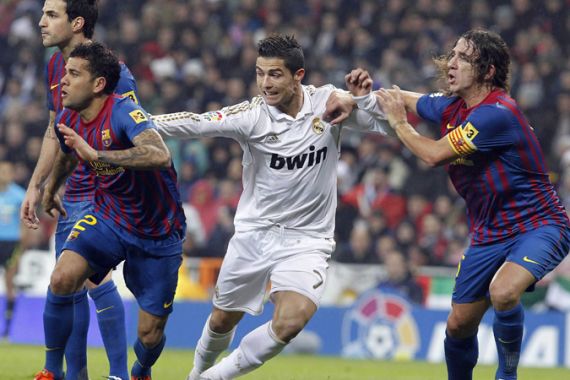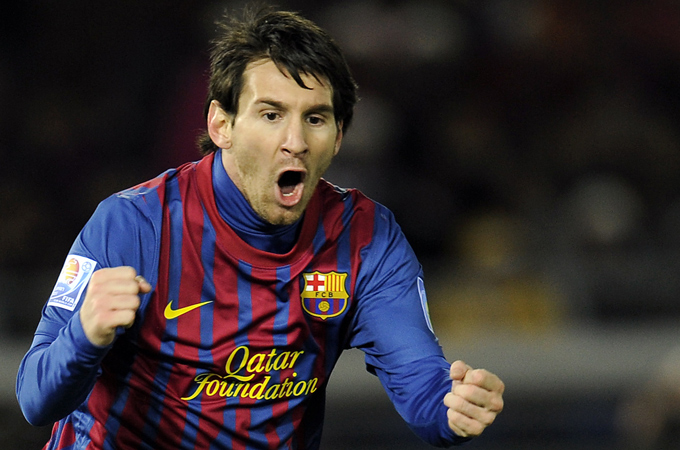Spanish clubs are under Real threat
Deeply in debt the Spanish League needs to redistribute television revenue if majority of La Liga clubs are to survive.

 |
| Barca and Real earn almost 19 times more from TV than the smallest clubs in Spain’s top division [EPA] |
As the newly-elected Spanish government’s sweeping austerity drive begins to bite, the need for wealthy Real Madrid and Barcelona to agree to a more equitable distribution of television revenue will become increasingly urgent.
Already deep in debt and under pressure from rising wage and transfer costs, the majority of Spain’s 42 professional clubs are bracing for a possible new recession, a fresh squeeze on advertising and sponsorship revenue, painful tax rises and a growing reluctance among distressed banks and parsimonious local authorities to provide loans and financial assistance.
Keep reading
list of 4 itemsHolders Man City go out of Champions League on penalties to Real Madrid
Barca crash out as Mbappe brace leads PSG to Champions League last four
Saudi reviews football fan rules after whip attack
The confluence of these factors, coming after years of profligacy and mismanagement, could even mean some of the
worst-affected clubs disappear altogether, according to Angel Barajas, an associate professor of financial management at the University of Vigo.
“We could see some going into administration but not being able to clean up their accounts in the time allocated by the court and doomed to dissolution,” Barajas said.
|
“We could see some going into administration but not being able to clean up their accounts in the time allocated by the court and doomed to dissolution” Professor Angel Barajas |
The sale of audiovisual rights for La Liga, which unlike in rival European leagues is negotiated by each club individually, nets around $768 million and Real and Barca scoop up about half the total between them, helping make them the world’s richest soccer clubs by income.
Their dominance means they can afford to buy the best players, and pay lavish wages, while many of their rivals have been forced into administration following a futile struggle to remain competitive.
A study published in June by Jose Maria Gay, a professor of accounting at the University of Barcelona, showed the 20 clubs in Spain’s top division had combined debts of some $4.4 billion at the end of the 2009-10 season.
Add to that more than $700 million owed by the 22 teams in the second tier and Spanish professional soccer is roughly $5 billion euros in the red.
Clubs owe nearly $890 million to the tax authorities alone, according to a report in El Pais last month.
‘Rescue plan’
La Liga urgently needs a complete financial overhaul, particularly with UEFA’s new economic guidelines coming into
force that include sanctions for clubs spending more than they earn, analysts say.
Introducing a system of collective bargaining for TV rights similar to the one used in the English Premier League would help stop more clubs getting into difficulties and make the league more competitive again, they add.
“The solution is to put into action a serious rescue plan which would allow clubs access to cash to settle their most
pressing debts,” Gay said.
“Then what is needed is a viability plan which would be equivalent to a relaunching of Spanish soccer,” he said.
“The prerequisite is that the clubs centralise television rights and agree a serious and effective means of managing them, at the international level as well as the national.
“Until this step forward is taken, the finances of Spanish clubs will continue to deteriorate, with ever-more terrifying
numbers in their accounts.”
A study last year by consulting firm Sport+Markt showed Real and Barca earned almost 19 times more from TV than the smallest clubs in Spain’s top division, by far the biggest gap in the major European leagues.
The richest English clubs, who have a system of income sharing, earned about 1.7 times more than their smaller rivals.
Fairer future?
However, despite pressure from domestic rivals like Sevilla and Villarreal, Spain’s big two have shown little sign they are ready to give ground.
Officials have said that from the 2015-16 season onwards, when new TV contracts would come into force, the pair would be prepared to share some of the extra money that was negotiated with media companies without reducing their current income.
However, analysts say that would be likely to merely cement their dominance and note that in the current economic climate it is not certain the new contracts will be worth more.
|
“With all that the government has to cope with it is not in a position to tackle football” Analyst Placido Rodriguez |
“We all know why there are 27 clubs in administration,” Carlos Gonzalez, president of second-division Cordoba, told the latest edition of the professional soccer league’s magazine.
“I am convinced that none of the presidents have been stealing but many of them thought the clubs were like toys through which they could channel business with their own companies,” he said.
“So of course when the financial crisis arrived everything collapsed. Income from ticketing, club memberships and
advertising is falling all the time and we have no idea what money we’ll get from TV in the future.
“We are in crisis, just like the rest of the country and the entire western world.”
Spain’s ruling centre-right People’s Party (PP) has said it plans to encourage Real and Barca to find consensus with their rivals on a fairer distribution of TV money.
However, analysts including Placido Rodriguez, a professor of economics at Oviedo University and a former chairman of La Liga club Sporting Gijon, are sceptical the government will have the time or inclination to address soccer’s woes.
“There won’t be a new financial plan to clean things up,” Rodriguez said.
“With all that the government has to cope with it is not in a position to tackle football,” he said.
“They have enough on their plate with sorting out the banks.”